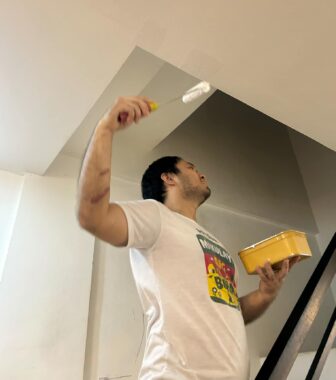How life skills training could help people with hemophilia
A columnist imagines how hemophilia organizations could get involved

My husband, Jared, and I have been working on some big home renovations lately. Under the supervision of my dad, who is a civil engineer, Jared learned how to do various jobs. He rerouted some water pipes, plugged up some holes, and painted. He also watched as an electrician installed lights and a ceiling fan. The process was more complicated than it looked on paper and took a couple days.
Jared, who has severe hemophilia B and a seizure disorder, told me that he appreciated the opportunity to learn something new. He values every chance he gets to use his hands to create or repair something. Ever since he was a kid, he’s enjoyed being a handyman. When he became a dad and we moved into our own place, he rediscovered his love for it.
Life skills training by local hemophilia organizations

Alliah Czarielle’s husband, Jared, does some home renovation, including painting. Because he has a seizure disorder, he takes extra safety steps when working, such as ensuring others are around. (Photo by Alliah Czarielle)
As we were talking, we thought it would be a great idea if our local hemophilia organization offered life skills and home management training in addition to their psychosocial development gatherings and music workshops.
Here in the Philippines, the government offers free or discounted training programs for those interested in learning various technical skills via an organization called the Technical Education and Skills Development Authority. It’d be great if disability organizations could do something similar.
Local hemophilia organizations might also be able to provide safety training for tasks that might be considered risky, such as those that require physical exertion or climbing.
Life skills for employment and the home
Many young people with hemophilia worry about how to get a job or earn money. They may feel disadvantaged when applying for jobs because of the limitations imposed by their condition. Some may not be able to keep up with a traditional four-year academic career that would help them become more employable. A life skills program might be more practical, and if it’s offered by a hemophilia or similar organization, it could be more accessible.
This kind of training would be helpful not only for employment, but also for those who intend to start families. In Jared’s circle, many people with hemophilia are married or have kids. They’ll likely want to live in their own homes.
For homeowners, knowing how to perform basic repairs is invaluable. Even if you can hire a skilled worker, having basic knowledge helps you assess the fair value of the work. In the real world, scammers exist, so it’s essential to be cautious and protect your hard-earned money. That’s especially important for those with health conditions, as our money is needed for medication, checkups, mobility aids, and other necessities.
Learning life skills is not just about independence; it’s also about empowerment. For people with hemophilia like Jared, it means having agency, confidence, and control in their own abilities as human beings. This way they can secure a better quality of life for themselves and their families.
Note: Hemophilia News Today is strictly a news and information website about the disease. It does not provide medical advice, diagnosis, or treatment. This content is not intended to be a substitute for professional medical advice, diagnosis, or treatment. Always seek the advice of your physician or another qualified health provider with any questions you may have regarding a medical condition. Never disregard professional medical advice or delay in seeking it because of something you have read on this website. The opinions expressed in this column are not those of Hemophilia News Today or its parent company, Bionews, and are intended to spark discussion about issues pertaining to hemophilia.







Leave a comment
Fill in the required fields to post. Your email address will not be published.